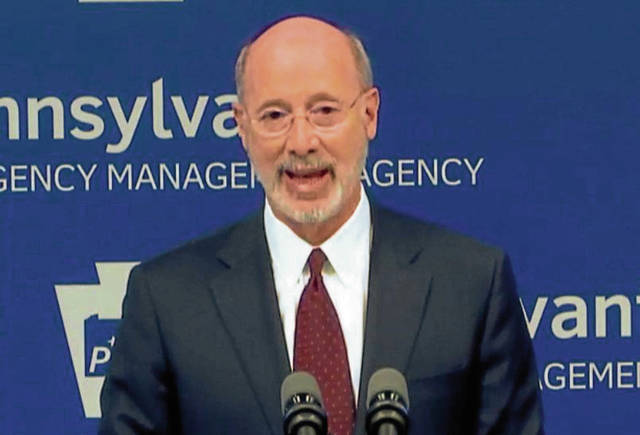https://naviga.triblive.com/local/regional/gov-wolf-neighboring-states-work-on-regional-plan-to-reopen-economy/
Wolf: ‘New normal’ will take time, 3 phases of response

While the adherence to the state’s stay-at-home orders is “bending the curve and diminishing the surge” of new cases, Gov. Tom Wolf said Monday he was not ready to predict when he will lift the sanctions against business activity that are crushing the economy.
“There is no hard, fast metric to achieving victory,” Wolf said in a brief address Monday night.
Wolf sees the battle against covid-19 as a three-stage process, adding that Pennsylvania is still in the first stage of fighting to reduce the rate of infection among the population by sheltering in place. During this time, the governor said, the state still needs to build capacity so the health system is not overwhelmed by the disease. He acknowledged this has not come without “a whole host of sacrifices” — closing schools and businesses and keeping social distance from each other.
“The economy is still tanking” as a result of the closures he ordered, Wolf noted.
The governor says the second stage, a transitional phase, will occur when there is more and better testing, including tests for coronavirus antibodies to determine who is immune. Only then will there be a reopening of society. But “the answer is still far from perfectly clear” as to when the state will get to that transitional stage, Wolf said.
He would only say he hopes reaching the third stage, the new normal, “that will be very different” in people’s lives, could be done “in a reasonable time frame.”
Pennsylvania officials will work with leaders from five neighboring states to coordinate efforts to reopen businesses closed to slow the spread of coronavirus, Wolf said earlier Monday.
Wolf made that announcement with the governors of Connecticut, Delaware, New York, New Jersey and Rhode Island during a press call Monday. Massachusetts joined later.
“As we figure out how we’re going to reopen our schools, how we reopen our businesses and our homes, we’re also going to recognize that we’re trying to figure out how we’re going to restore the sense of hope that this pandemic has taken away,” Wolf said.
Reopening the economy has to happen responsibly, Wolf said.
“You’re not going to have a healthy economy if you have an unhealthy population,” he said.
The governors did not share a hard timeline for reopening businesses. New York Gov. Andrew Cuomo said talks will start Tuesday.
The 18-member council will include leaders from each state and will weigh health and economic factors.
From Pennsylvania, that includes the state health secretary and secretary of the Department of Economic and Community Development, as well as the governor’s chief of staff.
Wolf ordered all non-life-sustaining businesses in Pennsylvania to close March 19. Last week, he ordered the closure of schools for the rest of the academic year.
More than 24,000 people in Pennsylvania have been diagnosed with covid-19 and 524 people have died from the virus since early March, according to figures provided by the Pennsylvania Department of Health.
Many of those cases are located in the southeastern part of the state, with hot spots in Delaware, Montgomery and Philadelphia counties.
While the number of new cases reported statewide each day appears to be slowing, health officials have warned Pennsylvanians that social distancing measures still are necessary to prevent the number of cases from spiking again.
“We need to satisfy ourselves that the disease will not outstrip” the capacity of the state’s health system to deal with it, Wolf said. More personal protective devices are needed — masks, gloves, face shields — as well as ventilators, the governor added.
Keeping the coronavirus at bay will give researchers more time to develop a vaccine, Wolf noted.
The governors said they are keeping such concerns in mind as they consider how to reopen businesses across the six-state region.
“This virus doesn’t care about state borders, and our response shouldn’t either,” Rhode Island Gov. Gina Raimondo said.
Plans to reopen the economy will consider how area residents travel for work and recreation, the governors said, noting that thousands of people commute throughout the New York-New Jersey-Connecticut region every day.
The Interstate 95 corridor has become a hot spot for covid-19 cases in Connecticut.
“It’s the commuter corridor for us, but it’s also the covid corridor,” Connecticut Gov. Ned Lamont said.
Copyright ©2026— Trib Total Media, LLC (TribLIVE.com)
